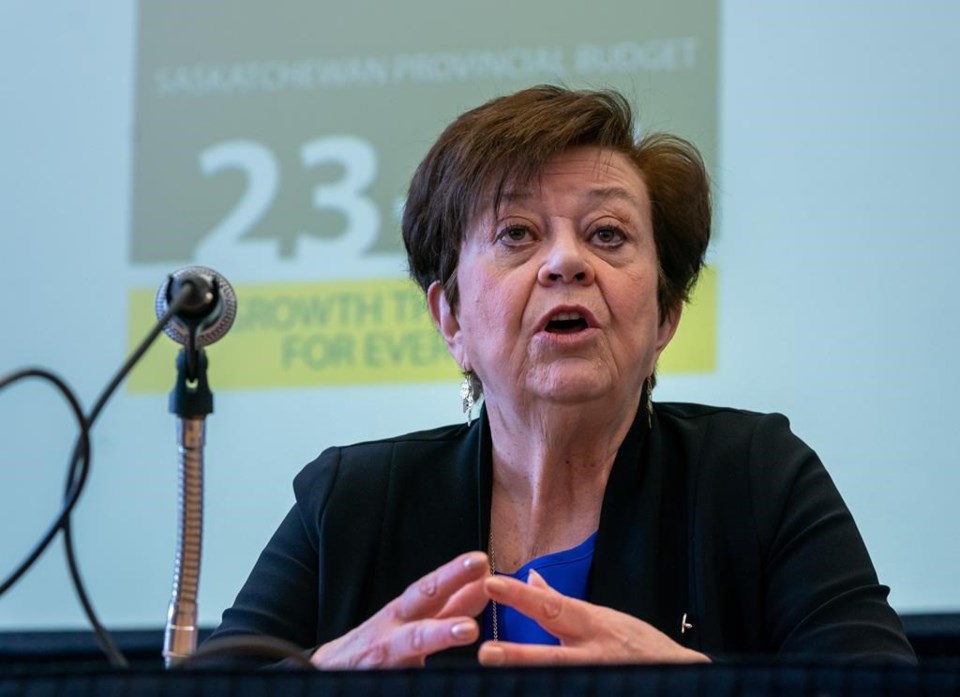REGINA — The Saskatchewan government projected a $1-billion surplus in its budget Wednesday, with no new taxes and millions in new spending.
The budget for the coming fiscal year is fuelled by higher non-renewable resource and tax revenue, which Finance Minister Donna Harpauer said reflects “balanced management.”
Harpauer said the government is to use much of the surplus topay down debt, but there is $431 million in new health-care funding.
“When we can, I think it's very important to break down debt,” she told reporters. “It goes to good balance.”
The 2023-24 budget projects revenues of $19.7 billion, a nearly 15 per cent increase from last year’s budget.
The government expects to spend $18.7 billion, with $7.1 billion earmarked for health care and $4 billion for child care, as well as primary and post-secondary education.
Operating debt is expected to fall to $7.5 billion. Gross debt, which includes the debt of Crown corporations, is pegged at $30.9 billion.
Critics said the budget fails to adequately address cost-of-living concerns and health-care strains.
The Opposition NDP said the Saskatchewan Party government missed the mark on its spending priorities and that now is the time to provide affordability relief and offer more targeted health funding.
“The finance minister got religion on (debt) this year, at a time when our health-care system is crumbling and our schools are in desperate need of an investment,” NDP Leader Carla Beck said.
“This is a budget about choices and a budget that shows just how out of touch this government is.”
Saskatchewan Union of Nurses President Tracy Zambory said the budget "does nothing" about staffing shortages at a time when health care is in crisis.
"There's nothingof retention, nothing to incentivize this health-care workforce to stay in Saskatchewan, particularly mid-career and senior nurses," Zambory said in a statement. "Other provinces in Canada have prioritized retaining their registered nurses, but here at home, you guessed it: nothing."
The government plans to provide the Saskatchewan Health Authority with an additional $191.4 million, with money going to hire and retain staff, including physician assistants.
Like the rest of the country, Saskatchewan’s health-care system has been short-staffed and under immense strain, which has caused long wait times and delayed surgeries.
The province plans to provide an additional $42.5 million to reduce surgical wait times. The government has also earmarked $518 million for mental health and addictions.
Harpauer said she had to strike a balance between debt repayment and health-care spending.
“If you put it into health care, and then you say, ‘just kidding’ the following year because the revenue isn't there, what have you really gained?” Harpauer said. “It depends what the surplus is from.”
Beck said the health funding fails to “rise to the challenge” in addressing strains in the system and offers no harm-reduction measures.
She said there is also a lack of funding for schools. The province has earmarked roughly $2 billion for school divisions, which represents a $49 million increase.
Samantha Becotte, the president of the Saskatchewan Teachers' Federation, said that level of funding could result in school boards having to make cuts.
"I'd love to see more of an investment in them and their future and the future of all kids across our province, because that's the future of Saskatchewan," she said.
Harpauer said the budget also includes "targeted" measures for people with low incomes, seniors and people with disabilities. There is an additional $26.6 million for programs to help low-income people pay for shelter and utilities.
However, Beck said the changes don't cut it.
“We've seen the ranks of the homeless. We've seen the ranks of those using the food bank,” she said. “When we were looking at the cost of groceries, the cost of housing, the cost of utilities — it does not go very far for people.”
Premier Scott Moe said the increase in social benefits will be meaningful to recipients.
"It may not mean a lot to the NDP, but it certainly is going to mean a lot to that individual, that senior in our community who may be a family member that qualifies for the personal care home benefit," Moe said.
The budget also includes $7 million for the new Saskatchewan Marshals Service, which is meant to work with other policing agencies on locating and arresting people who face warrants.
The government plans to spend $3.2 million to expand the RCMP’s warrant enforcement team in Prince Albert and Crime Reduction Team in the North Battleford area.
There is to be $7.4 million to administer the province's incoming firearms legislation, which includes a ballistics lab and a unit to oversee firearm licensing, storage and transportation.
The government is forecasting steady economic growth, with strong demand for resources, but stabilized commodity prices. Finance officials project the province’s economy grew by 4.8 per cent in 2022.
The government has predicted smaller surplus budgets for the next three fiscal years.
This report by The Canadian Press was first published March 22, 2023.
Jeremy Simes, The Canadian Press




